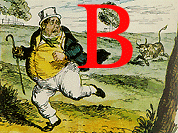Alexander Bain (1818-1903), one of the key figures in the development of British psychology, is regarded as the founder of the subject in its recognisably modern, empirical form. He found it as a branch of philosophy, and left it with its scope and methodology as a science clearly defined, and its physiological foundations sketched out.
He taught grammar, composition, rhetoric, logic and moral philosophy at the university in his native Aberdeen, where he was appointed to the chair of logic in 1860. In 1876 he founded the periodical Mind, of which he remained the proprietor until 1892. He associated with political radicals, such as J.S. Mill, who approved of Bain's treatment of novel-reading in a review in the 1859 Edinburgh Review.

efore quitting the subject [emotions of action], the Literature of Plot-interest claims some notice. The position of the spectator of moving events is greatly enlarged by language, which can bring before his mind scenes witnessed by other men; and, in so far as he is able to conceive what is thus related, he catches the fire of the actual witness. This is the interest of story, which is such a widely-spread source of excitement. The narrative of a chase, a battle, an adventure, places the hearer under the dominion of the emotion before us. The interesting stake, at first remote and uncertain, but gradually brought nearer as the successive incidents are recounted, keeps up that animated suspense, felt alike by the actor, the looker-on, and the hearer or reader, rendering it difficult for the mind to entertain any new subject till the declaration of the final issue.
The recital of what befalls our friends, and the men and societies belonging to our generation, is the commonest and directest mode of stirring up our attention and suspense. We can also be affected by the narratives of past history, some of which are more particularly adapted for this kind of interest. The struggles that have preceded vast changes, contest, revolutions, keep the reader in a state of thrilling expectation; while the inner plots and minor catastrophes serve to discharge at intervals the pent-up currents, and vary the direction of the outlook. Whatever the achievements are that rouse the feelings of a reader – whether wars, conquests, human greatness, or progress and civilization, – the moments, when these were pending in doubtful issue, are to him moments of earnest engrossment.
While the historian is bound by fact and reality, the poet or romancer is able to accommodate his narrative so as to satisfy the exigencies of plot-interest by devices suited thereto. Calculating how much suspense the mind of a reader can easily bear, and how this can be artificially sustained and prolonged; casting about also for the class of events best able to awaken agreeable emotions in a story; the artist in narrative weaves together a tissue of incidents aiming at some one conclusion, which, however, is to be accomplished through many intermediate issues. Epic and dramatic poetry were the first forms of plot fiction; the prose romance or novel is the more modern and perennial variety. Many strings of interest may be touched by a highly-wrought romance, but the dissolution of the plot would destroy what is essential in the structure, and leave the composition lifeless and tedious to the mass of readers.
[Bain returns to the subject of fictional plot later in The Emotions and the Will: ”Among the pleasures incident to Action, we ranked Pursuit and Plot-interest, whose fascination sometimes becomes too great, and requires to be restrained. A certain check must be placed upon the excitement of sport and the engrossment of story in Youth, as engendering a species of dissipation inconsistent with the sober engagement of life. When allowed to run riot, the interest in mere narrative and plot becomes a source of serious annoyance. [468]
Links to Related Material
Bibliography
Bain, Alexander. 1859; 'The Emotions', Chapter X.12, 'Literature of Plot-interest', pp. 196-97. [The second, enlarged edition of The Emotions and the Will (1865) is the standard edition to quote in the history of psychology, but the passages used here remain almost unchanged.]
Mill, J. S. 'Bain's Psychology,' Edinburgh Review 110 (October 1859): 287-321.
Last modified 23 May 2022